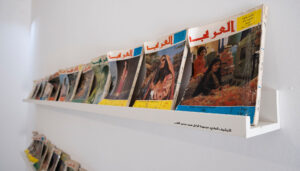Written By Ahmad Humeid from 360east.com
FULL DISCLOSURE: I am a partner in TootCorp, creator of ikbis.com.
Before we start talking about the “failure” of Arab web 2.0, let us first admit that the Arab world is still stuck in web 0.5 and has not even reached web 1.0. By global standards, web 1.0 encompasses things like e-commerce (think Amazon.com and eBay), full featured newspaper sites (think The New York Times) sites, personalizable portals (think My Yahoo).
I personally have been around the web industry since the birth of the commercial internet in the Arab world, as I was part of the small founding team of the (now defunct) Arabia.com (back in 1995), arguably the first Arab web portal. In our naivety, we where already pitching the portal as a place for “merchants to do business.” Amazon.com was born around the same time. Yet, for the past 12 years I’ve been waiting to see the emergence of a major Arab e-commerce player. I am still waiting. Most people I ask have never bought anything online from an Arab online retailer.
Blame it on low internet penetration or on the commercial fragmentation of Arab markets. Blame it on Syria if you want (the fact that Arab countries with large populations like Syria and Iraq came online very late is indeed a major factor behind the timid pace of internet development in the region). The bottom line is: We’re not even at Web 1.0, while the world is already talking about web 3.0.
In the past couple of years, we’ve seen the emergence of a number of new Arab web companies who saw themselves as the new generation of the web industry in the Arab region. An interesting side note here is that a number of them were born in Jordan, just like some of earlier pioneering sites (Maktoob.com, Jeeran.com, Arabia.com).
TootCorp started with its experimental blog aggregator itoot.net in January 2006. It then launched the first Arab video and photo sharing site ikbis.com in November 2006. This was followed by Maktoob.com launching its own photo and video sharing sections. Then D1G.com came along with the intention of becoming a major portal which includes everything from email to cartoons.
In the past year, Jeeran.com started morphing into a social network (ala Facebook). Mecca.com wanted to be the facebook for Muslims. Half a dozen of Arab DIGG clones, like Wapher.com and Darabet.com were launched.
But what have all these sites really achieved?
Probably not much. Or not much, yet.

If you look at the Alexa chart above, which covers the rankings of a number of old and new Arab sites over the past year, you will notice that the whole Arab web picture doesn’t look too pretty.
Maktoob.com, the well financed leader (with a reported valuation in the ten of millions of dollars), has shown some growth a year ago (fueled by an aggressive acquisition strategy that brought some high traffic Saudi forums under maktoob’s wing) then a decline in the past few months. Maktoob doesn’t seem to grow anymore.
Jeeran.com, which recently received a good financing shot in the arm, has noticeably declined over the past year. So has Albawaba.com.
Also see D1G.com, supposedly a Maktoob killer: Aggressive growth for six months, fueled by a lot of money thrown at acquisitions of sites and heavy advertising on Facebook and elsewhere. Growth then stagnation.
Ikbis is no exception here. Nice growth in the first half of the graph, then a pretty flat performance.
All of this is happening at a time when Facebook is taking the Arab web by storm. In Jordan, a small market, Facebook has grown from zero to around 100,000 users in less than a year. There is growth in broadband internet connections across the Arab region. But the new (and old sites) can’t seem to capture that growth.
That isn’t to say that all these sites and companies are doomed to failure. In fact, they some of have been able to translate their traffic they have into revenues. Advertisers believe in the web more these days. Professional internet publishers can reap the benefits and survive financially. But none of the old or the new players have quite cracked the nut of continued growth.
The low number of net users in this region will remain an obstacle in the path of growth. I also believe that the industry has not been able to deliver relevant innovation to Arab users. Why can a site like Facebook grow this fast, while Mecca.com has less traffic than this blog.
User also have more choice these days. They aren’t all flocking to a limited number of sites like the good old days of the net.
The year 2008, might see some exciting developments on the Arab web. The international web leaders are starting to take notice of the Arab market. Deep pocketed regional media giants (like MBC) are finally understanding that the web is to be taken seriously. The traditional web and the mobile web will move closer to each other, bringing mobile operators into the game.
A friend of mine once said: “The Arab world has missed the agricultural revolution, the industrial revolution and the electronics revolution. It would be a real shame if it misses the web revolution.”
The lesson: the new kid on the Arab net have their work cut out for them.










